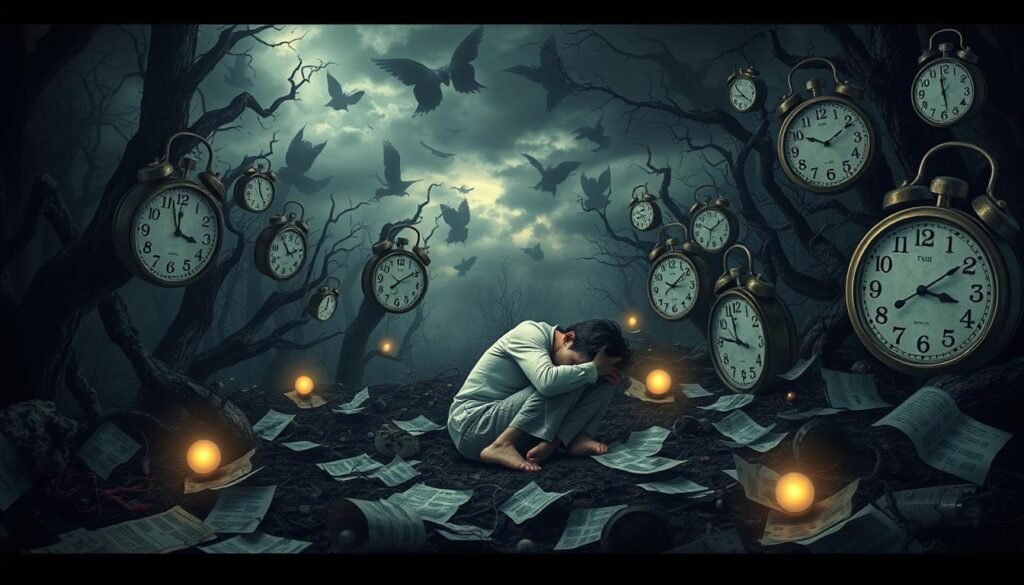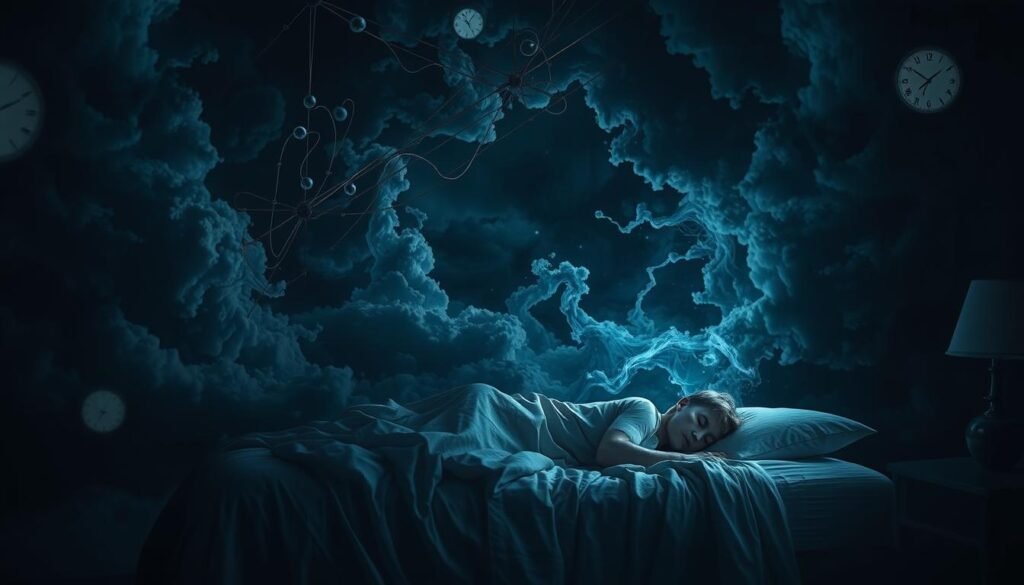Nearly two-thirds of Americans, about 66%, say stress keeps them awake. Most adults need 7 to 9 hours of sleep each night. Yet, insomnia and anxiety make daily life tough. These problems are linked, causing stress and bad sleep to worsen each other. This harms mental health a lot.
It’s key to know why insomnia and anxiety happen for those facing these issues. Talking about what causes insomnia can help us find good ways to handle it. In this piece, we’ll look closely at how insomnia and anxiety are connected. We’ll explore their causes, signs, and how to make life better.
Key Takeaways
- Insomnia affects a significant portion of adults, often linked to chronic anxiety.
- Identifying insomnia triggers can help manage both sleep and anxiety issues.
- Stress has a documented impact on sleep quality and overall mental health.
- Many individuals experience anxiety disorders that co-occur with sleep disturbances.
- Understanding sleep hygiene is vital in improving sleep patterns and mental health.
- Professional help may be necessary for persistent insomnia and anxiety symptoms.
Understanding Insomnia and Anxiety
Insomnia makes it hard to fall or stay asleep, leading to tiredness and irritability during the day. Anxiety often shows up as fear and worry, a common response to stress. These conditions tend to feed into each other, creating a vicious cycle that affects both sleep and mental well-being. Many who battle anxiety also encounter significant sleep difficulties. This emphasizes the need to explore the link between insomnia and anxiety.
A study involving 25,130 adults in Norway found a clear connection between insomnia and anxiety disorders. For those with insomnia, the chance of developing anxiety was notably higher, with an Odds Ratio (OR) of 4.9. This was based on findings from two big surveys. The data highlights a strong connection between ongoing insomnia and mental health issues. It underscores the importance of managing sleep problems for better mental health.
Understanding these conditions helps in managing them and finding effective treatments. Since insomnia can be spotted before anxiety issues begin, acting early is key. Knowing more about sleep health is crucial for better mental health management overall.
| Condition | Odds Ratio for Anxiety | Duration of Effects |
|---|---|---|
| Insomnia (HUNT-1) | 1.6 | Up to 10 years |
| Insomnia (HUNT-2) | 3.4 | Up to 10 years |
| Insomnia (both surveys) | 4.9 | Up to 10 years |
| Chronic Insomnia Statistics | 30% prevalence | N/A |
What Are the Common Causes of Insomnia and Anxiety?
To understand why people can’t sleep or feel anxious, we need to look at several factors. Many people struggle with sleep issues due to stress, bad habits, and mental health problems.
Stress and Life Events
Stress is a big reason why people can’t sleep well. Things like work pressure, personal issues, or health worries can make anxiety worse. This can stop them from getting calm sleep at night. High stress can keep their minds busy, making it hard to relax when it’s time to sleep. This stress-sleep problem creates a vicious circle. Anxiety messes up sleep, leading to even more stress.
Poor Sleep Habits and Routines
Not sleeping and waking up at the same time every day can cause insomnia and anxiety. Many people don’t stick to a regular sleep schedule, messing with their body’s clock. Doing energizing things before bed, like using phones or drinking coffee, can also hurt sleep. This can result in ongoing sleep problems, making it hard to fall or stay asleep.
Mental Health Disorders
Issues like depression and anxiety often lead to insomnia. Around 40% of people with anxiety disorders also have trouble sleeping. This link is concerning because anxiety can make insomnia worse, forming a harmful cycle. Treatments like cognitive behavioral therapy for insomnia (CBT-I) can help manage these linked problems.
| Factor | Impact on Sleep |
|---|---|
| High Stress | Elevates anxiety, triggering sleep disturbances |
| Poor Sleep Habits | Disrupts circadian rhythm, leads to chronic insomnia |
| Mental Health Disorders | Increases likelihood of insomnia, exacerbates anxiety |
Insomnia Triggers You Should Know
Understanding what causes insomnia is key to managing it. There are certain things we do and consume that can disturb our sleep. By knowing what these are, we can work towards sleeping better.
Caffeine, Nicotine, and Alcohol
Caffeine, nicotine, and alcohol can seriously affect your sleep. Drinking coffee or soda in the afternoon or evening can keep you wide awake. This is because caffeine is a strong stimulant.
Nicotine also disturbs your sleep, making good rest hard to find. Though alcohol might seem like it helps you doze off, it actually ruins your sleep quality as the night goes on.
Travel Schedules and Time Zone Changes
Traveling a lot or changing time zones often can mess with your sleep. These changes can upset your body’s clock, leading to trouble sleeping. Conditions like jet lag make it tough to adjust to new time zones.
Whether you’re on a night shift or flying frequently, these activities can disrupt your rest.
| Substance | Effect on Sleep |
|---|---|
| Caffeine | Stimulates alertness, disrupts sleep when consumed late |
| Nicotine | Increases disturbances, complicating sleep patterns |
| Alcohol | Initially aids sleep but causes fragmentation later |
| Travel Schedules | Disrupts circadian rhythms, leading to insomnia |
| Time Zone Changes | Causes jet lag, complicating sleep quality |
Paying attention to how caffeine, nicotine, and alcohol affect sleep is important. Being aware of these insomnia causes can lead to better sleep habits. This helps create a more sleep-friendly environment.
Factors Contributing to Anxiety
Anxiety is a complex condition that different things influence. Knowing these factors can help find ways to deal with it. People with a family history of anxiety tend to be at greater risk. Also, long-term health issues can make anxiety worse.
Moreover, stress from social and financial problems can increase anxiety. This is especially true for those worrying about money or jobs.
Genetic and Environmental Influences
Genes play a big role in anxiety disorders. If anxiety is common in your family, you might be more prone to it. Also, things like trauma can make this genetic risk even stronger.
Chronic Health Problems
Having chronic health issues can make anxiety more intense. For instance, heart or breathing problems can lead to more anxiety. It’s very important to deal with these health issues together.
Social and Economic Stressors
Problems like not having a job or money worries can make anxiety worse. Tough situations in life, like relationship problems, add to this stress. Recognizing and tackling these stressors is key to feeling better.
Anxiety and sleeping problems often go hand in hand, making both worse. Mental health care is important not just for anxiety but also for preventing diseases like Type 2 Diabetes. Research shows how crucial mental health is. Read more about the importance of mental health.

| Factor | Details |
|---|---|
| Genetic Influences | Increased risk of anxiety disorders among those with a family history. |
| Chronic Health Problems | Conditions like heart disease can worsen anxiety symptoms. |
| Social Stressors | Job loss or financial strain can significantly heighten anxiety levels. |
| Environmental Factors | Traumatic events can trigger anxiety, especially in predisposed individuals. |
| Economic Stressors | Poverty and lack of resources increase vulnerability to anxiety disorders. |
Sleep Disturbances Causes
Understanding sleep disturbances causes means looking at different sleep issues. Insomnia is a big problem for many. It makes falling or staying asleep hard. Stress and lifestyle are usual causes, but health issues matter too.
Sleep Disorders Like Sleep Apnea
Sleep apnea is a serious sleep issue. It stops your breathing while you sleep, for 10 seconds or more. It makes you very tired during the day. Often, a bed partner will notice it first because of loud snoring or gasping. Sleep apnea messes up sleep and makes insomnia worse by breaking sleep patterns.
Restless Legs Syndrome
Restless legs syndrome (RLS) is another big cause of sleep problems. It gives you a strong need to move your legs when resting. RLS can wake you up many times at night. Sleep apnea and RLS show how complex insomnia root causes are. It’s key to deal with these issues to treat insomnia well.
It’s crucial to understand these disorders. A customized plan can improve sleep and health. Treatment options include lifestyle changes, therapy, or CPAP machines for sleep apnea. For more on sleep issues, visit this link.
The Connection Between Insomnia and Anxiety
The link between insomnia and anxiety is complex. About 28.6% of adults battle with insomnia. Anxiety disorders affect around 19.1% of Americans. This shows a strong tie between insomnia and anxiety, with each one making the other worse. Understanding this connection is key. It helps us tackle sleep problems caused by anxiety and improves sleep and mental health overall.
How Insomnia Worsens Anxiety Symptoms
Insomnia can make anxiety symptoms much worse. This creates a hard-to-break cycle. Up to half of those with anxiety also have insomnia symptoms. This leads to more irritability, less focus, and a drop in mental health. Not sleeping enough can make stress stronger. This affects how well a person can function every day.
The mental health of people not sleeping well can get much worse. This can lead to more problems like depression. A huge 90% of those with generalized anxiety disorder also struggle with insomnia. This shows how tough the insomnia-anxiety connection is.
How Anxiety Contributes to Sleep Disturbance
Anxiety also plays a big role in making it hard to sleep. People with anxiety might sleep much less than the 7 to 9 hours needed each night. Around 65% of those with anxiety and trouble sleeping can’t stop worrying at night. This cycle makes the sleep and mental health link even harder to manage. Anxiety makes insomnia worse, making good sleep hard to get.
This tough cycle can change a person’s mood. About 73% say they feel more irritable the day after not sleeping well.

| Key Statistics | Details |
|---|---|
| Insomnia Prevalence | 28.6% of adults experience insomnia |
| Anxiety Disorder Prevalence | 19.1% of adults in the U.S. have anxiety disorders |
| Insomnia and Anxiety Co-occurrence | About 50% of those with anxiety report insomnia symptoms |
| Impact of Chronic Sleep Deprivation | Increases risk for health issues like weight gain and hyperglycemia |
| Irritability from Insomnia | 73% experience increased irritability the next day |
Psychological Factors of Insomnia
Understanding the psychological factors of insomnia is crucial. Negative thoughts create significant sleep barriers. They often add to anxiety about sleeping. This anxiety about not sleeping can prevent restful sleep for many people.
Negative Thought Patterns
Negative self-talk and harmful thoughts can make relaxing hard. People with low self-esteem or those who are very critical of themselves may focus on their struggles. This increases stress. Studies show a clear link between these thoughts and insomnia, highlighting the need to address them for better sleep.
Fear of Sleep and Nighttime Anxiety
Fear of sleep can come from many sources, like past insomnia or linking night to distress. Nighttime anxiety then makes insomnia worse. This creates a cycle where the fear of not sleeping stops actual rest. Therapy can help people face these fears. This leads to better sleep and mental health. Treatment for insomnia often looks at these psychological issues. Insomnia management includes strategies focused on these factors.
Long-term Effects of Insomnia and Anxiety
Insomnia and chronic anxiety deeply affect both mental health and physical health. Around 8-10% of people suffer from chronic insomnia, increasing the risk of health problems. People with sleep disorders are much more likely to get depressed.
Not sleeping enough can hurt how you think. People with sleep problems often have trouble focusing, making decisions, and remembering things. This can lower life quality and worsen mental health over time.

Chronic insomnia is linked to heart disease and high blood pressure. Between 8-40% of people may have sleep issues, risking their health. Not getting at least 7 hours of sleep can cause weight gain, diabetes, and a weak immune system.
It’s important to know how insomnia affects health over time. Managing sleep and anxiety is key to better health. To learn more, read this in-depth article on chronic insomnia’s toll on health.
| Health Issue | Occurrence with Insomnia |
|---|---|
| Depression | 5 times higher risk |
| Hypertension | Increased risk |
| Heart Disease | Significant correlation |
| Diabetes | 2.5 times higher likelihood |
| Impaired Immune Function | Weakened response |
Strategies for Managing Insomnia and Anxiety
To handle insomnia and anxiety, you should use different tactics. The goal is to make your sleep better and lessen anxiety. Here are key ways to tackle insomnia and anxiety.
Developing Better Sleep Hygiene
Good sleep hygiene is vital for better rest. Having a regular sleep time helps your body’s clock. Follow these tips:
- Limit caffeine intake at least 4 hours before bedtime.
- Avoid alcohol consumption as it can interfere with sleep quality and duration.
- Ensure that meals are consumed 2 to 3 hours before sleep.
- Create a calming bedtime routine that may include activities like reading or light stretching.
- Utilize deep breathing exercises that focus on extending exhalation for about 5 minutes to alleviate anxiety before sleep.
Therapeutic Approaches: CBT-I
Cognitive Behavioral Therapy for Insomnia (CBT-I) is great for sleep troubles caused by anxiety. It helps you change bad thoughts and actions that hurt your sleep. Studies say CBT-I can make sleep better by 70% to 80%. This makes it a good choice over sleep drugs.
Medication Options
Sometimes, meds are needed for anxiety and sleep issues, but only if a doctor says so. Short-term use of certain sleep meds like Eszopiclone (Lunesta), Ramelteon (Rozerem), and Zolpidem tartrate (Ambien) might help. But, be careful of side effects like feeling sleepy during the day. Over-the-counter antihistamines might also make you sleepy or confused, especially in older people. Medicines should be a short-term fix while you work on other ways to handle insomnia.
Recognizing When to Seek Professional Help
Knowing when to get help for insomnia is key to better sleep and mental wellness. If your sleep problems last more than six months, see a healthcare provider. Long-term sleep issues might show deeper problems. Many adults wait too long, 3 to 4 weeks, before seeking help. This delay can make recovery harder.
It’s important to know when anxiety means you need professional help. Signs like feeling dizzy, sweating, or feeling sick might mean you have an anxiety disorder. If worry or negative thoughts mess with your day, it’s time to get help. Close to 18% of people in the U.S. face anxiety disorders. Knowing when to get help for anxiety and sleep troubles is vital.
About 25% of kids with sleep issues may have mental health concerns. Also, 40% of teens feel anxious often. It’s crucial for parents and their circles to know when to seek help. A drop in grades or less time with friends could point to bigger issues. These signs mean it’s time to look into it more.
Starting help early can make treatments work better. People who wait to get help for mental health issues often feel worse. Signs like being aggressive, pulling away from friends, or using drugs to cope show the need for expert advice. Professional help can deal with insomnia and anxiety well. Experts can offer personalized plans to handle these issues.
Conclusion
Insomnia and anxiety are closely linked. They greatly affect our health and happiness. By understanding what causes them, people can find their triggers. These include stress, emotional upset, and lifestyle habits like too much caffeine. It’s key to see how complex these issues are. Insomnia often points to other deep problems. So, managing sleep troubles is a big deal.
Thankfully, there are good treatments out there. Cognitive-behavioral therapy (CBT) works well for anxiety-related insomnia. Making changes to how we live can also help a lot with short-term insomnia. Plus, some meds can help get our sleep back on track. This can make life much better.
Since insomnia is a top complaint for adults, it’s crucial to handle sleep problems. Doing so improves not just sleep but also mental health. Seeking help, improving sleep habits, and dealing with anxiety can make a real difference. Prioritizing sleep boosts our overall well-being. It shows us sleep’s role in a balanced, happy life.